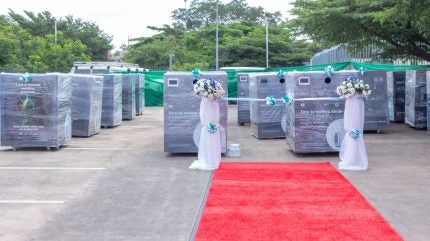
Nigeria has officially commissioned locally fabricated reverse vending machines (RVMs) in a bid to bolster its waste management system and promote circular economy practices.
These RVMs are set to be installed across 25 strategic locations within Abuja’s Federal Capital Territory.
The introduction of the 25 RVMs is anticipated to collect an estimated 540 tons (t) of polyethylene terephthalate (PET) bottles annually.
The new RVMs were manufactured by Ecobarter, a domestic woman-led digital technology waste startup.
The machines will provide residents with a convenient means to participate in recycling efforts.
The RVMs will be placed in high-traffic areas within Abuja, enabling citizens to deposit plastic bottles and aluminium cans in exchange for incentives.
Data collected digitally from this pilot will shape future waste management strategies in Abuja. If successful, it could potentially lead to the expansion of the RVM programme throughout other Nigerian cities, ultimately aiming for a nationwide rollout.
The project is a collaborative effort between the UN Industrial Development Organization (UNIDO) and the Abuja Environmental Protection Board.
It aims to serve as a benchmark for enhancing plastic collection systems, thereby reducing the environmental impact of plastic pollution and fostering sustainable industrial development within the country.
The initiative is also supported by UNIDO’s project ‘Promoting sustainable plastic value chains through circular economy practices’, funded by the Japanese government.
UNIDO initially partnered with Japan on an initiative to manage plastic waste in Nigeria in 2022.
During the RVM commissioning, Nigeria’s Environment Minister Balarabe Abbas Lawal highlighted that the RVMs represent a historic moment in waste management and reflect Nigeria’s dedication to nurturing local innovation and manufacturing.
Lawal also praised the steadfast support from UNIDO and the Government of Japan in tackling Nigeria’s environmental challenges.



